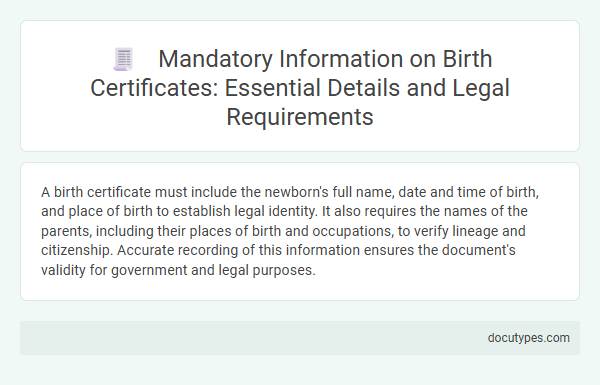A birth certificate must include the newborn's full name, date and time of birth, and place of birth to establish legal identity. It also requires the names of the parents, including their places of birth and occupations, to verify lineage and citizenship. Accurate recording of this information ensures the document's validity for government and legal purposes.
Introduction to Birth Certificates: Purpose and Importance
A birth certificate is an official document that records the details of a person's birth. It serves as vital proof of identity and legal existence.
Essential information on a birth certificate includes the full name of the individual, date and place of birth, and the names of the parents. Your birth certificate ensures access to various rights and services throughout your life.
Key Legal Requirements for Birth Certificates
| Information | Key Legal Requirements |
|---|---|
| Full Name of the Child | Must include first, middle, and last names to accurately identify the individual. |
| Date of Birth | Exact date (day, month, year) is required for legal age verification and record keeping. |
| Place of Birth | Specifies city, county, and state or country, establishing jurisdiction. |
| Parent(s) Names | Full legal names of mother and father to establish lineage and parental rights. |
| Sex of the Child | Legal identification of gender at birth. |
| Registration Number or Certificate Number | Unique identifier assigned by the issuing authority to authenticate the certificate. |
| Date of Registration | The date when the birth was officially recorded; critical for legal timelines. |
| Issuing Authority | Name and signature of the registrar or official authorized to issue the certificate. |
| Legal Statement or Certification | Declaration confirming the accuracy of the information, required by law. |
Your birth certificate must contain these mandatory details to meet legal standards and ensure proper identification and rights recognition.
Essential Personal Details Required on Birth Certificates
Birth certificates serve as official documents confirming an individual's identity and birth details. Essential personal details required on birth certificates include the full name of the newborn, date and exact place of birth.
Information about parents, such as their full names and sometimes their places of birth, must also be recorded. The certificate typically includes the gender of the child and the registration number assigned by the issuing authority.
Parentage Information: Parent Names and Details
Parentage information on a birth certificate is essential for establishing legal identity and family relationships. This section typically includes the full names of both parents, their places of birth, and dates of birth. Accurate parent details ensure proper documentation for citizenship, inheritance rights, and access to social services.
Date and Place of Birth: Mandatory Data Fields
The date and place of birth are essential data fields on a birth certificate that establish an individual's identity and legal status. These mandatory elements ensure accurate record-keeping for governmental and legal purposes.
- Date of Birth - Specifies the exact day, month, and year the individual was born, providing a precise age and identity reference.
- Place of Birth - Indicates the city, state, or hospital where the birth took place, offering geographical context and jurisdictional information.
- Mandatory Inclusion - Both date and place of birth must be included on all official birth certificates to comply with legal standards and administrative requirements.
Registration Number and Issuing Authority
A birth certificate must contain specific mandatory information to be legally valid. Registration number and issuing authority are critical elements for identification and authenticity.
- Registration Number - A unique alphanumeric code assigned to each birth record for official tracking and verification.
- Issuing Authority - The government office or registrar responsible for issuing the birth certificate, ensuring its legitimacy.
- Importance of Both - These details prevent fraud and facilitate easy retrieval of birth records in governmental databases.
Including the registration number and issuing authority is essential for the legal acceptance of a birth certificate.
Signature and Official Seal: Validation Criteria
What signature and official seal are mandatory on a birth certificate? A birth certificate must include the signature of the registrar or authorized official to confirm its authenticity. The official seal of the issuing authority is also required to validate the document and prevent fraud, ensuring your birth certificate is legally recognized.
Citizenship and Nationality Information
A birth certificate must contain specific details to establish identity, including citizenship and nationality information. This data verifies Your legal status and rights in the country of birth.
- Citizenship Status - Indicates the newborn's formal citizenship as recognized by the issuing country.
- Nationality Declaration - Defines the national origin associated with the individual's birth registration.
- Parental Citizenship - Documents the citizenship of the parents, supporting nationality claims for the child.
Legal Implications of Missing or Incorrect Information
A birth certificate must include essential details such as the full name of the child, date and place of birth, and parent(s) names. Missing or incorrect information on these key elements can lead to significant legal challenges.
The absence of accurate data may affect identity verification, inheritance rights, and eligibility for government services. Courts often require precise birth certificate information for legal proceedings or benefits claims. Ensuring your birth certificate is accurate protects your legal status and access to essential rights.
What Information Is Mandatory on a Birth Certificate? Infographic

